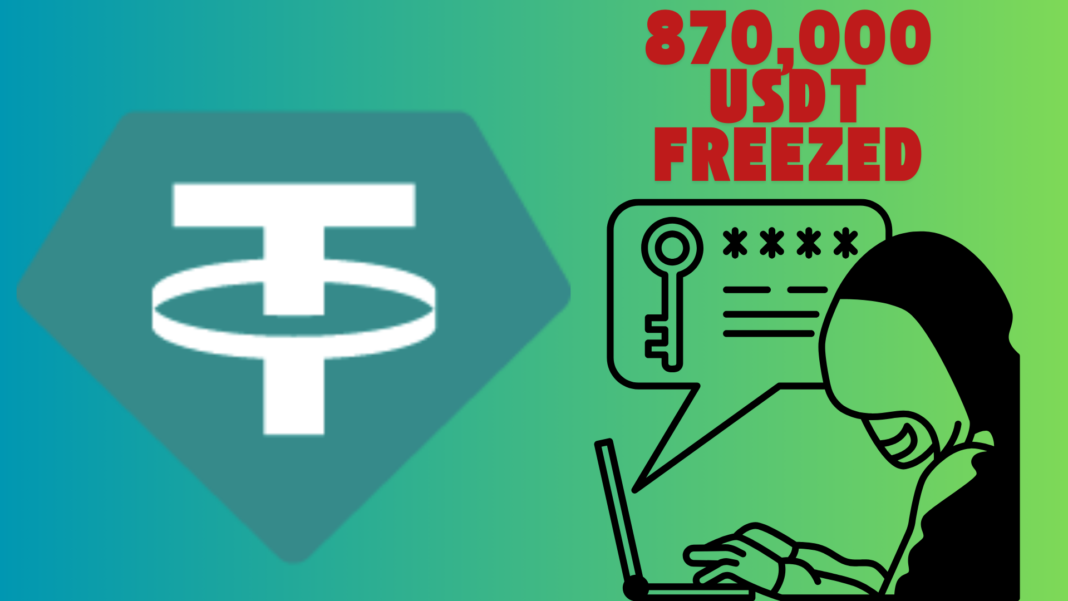Tether, the company behind the USDT stablecoin, has frozen three wallet addresses holding a combined total of approximately $870,000 in USDT.
The action follows an alert from MistTrack on X, an on-chain analytics platform, which flagged the wallets for suspected involvement in crypto-related crimes.
These include theft, phishing schemes, and the increasingly prevalent “pig butchering” scam, a sophisticated form of fraud where victims are manipulated over time into investing in fake opportunities.
Tether’s swift intervention highlights its ongoing efforts to monitor suspicious activity and safeguard the use of its stablecoin from exploitation.
Forensic Analysis Reveals Troubling Patterns in Frozen Wallets
The three wallets in question each displayed behavioral patterns associated with illicit activity.
The first wallet, identified as TGi8t…HZDfU, had a history of transactions involving centralized exchanges such as WhiteBIT and OKX, platforms often used as initial off-ramps for laundering stolen crypto.
The second address, 0xa1e…9ec53f, was directly tied to a cluster of wallets already flagged for participation in phishing attacks and pig butchering schemes.
Meanwhile, the third address, 0xca9…373b8, had notable interactions with Gate.io, suggesting possible attempts to cash out stolen funds.
The combination of exchange interactions and known scam associations raised enough concern for Tether to act immediately.
MistTrack’s Role Highlights the Power of Blockchain Intelligence
MistTrack’s identification of the suspect wallets underscores the growing importance of blockchain forensics in combating crypto crime.
Leveraging transaction history, address clustering, and behavioral analytics, platforms like MistTrack can trace the digital footprints of bad actors with impressive precision.
The case shows how data transparency inherent in blockchain networks, when paired with advanced analytics, allows for near real-time detection of fraud.
Beyond helping recover funds, these insights enable crypto issuers and regulators to build a more secure and trustworthy environment for users and investors.
Tether Asserts a Stronger Regulatory Stance Through Proactive Freezing
Tether’s decision to freeze the wallets reinforces its stance on compliance and responsible stablecoin issuance.
While USDT facilitates rapid and borderless transactions, it has also become a popular tool among cybercriminals due to its liquidity and perceived anonymity.
By taking action against suspected criminal wallets, Tether is sending a message that it is closely monitoring its network and ready to cooperate with law enforcement when needed.
As global scrutiny of stablecoins intensifies, Tether’s readiness to freeze assets under suspicion may become a key element of industry-wide compliance standards.
Pattern of Interventions Demonstrates Tether’s Ongoing Efforts to Curb Abuse
This isn’t the first time Tether has taken action against wallets tied to illicit activity.
In recent months, the company froze over $11 million in USDT linked to phishing scams across TRON and Uniswap, responding to a surge in fraud cases, particularly on Telegram.
In another instance, Tether froze $27 million USDT held by Russian exchange Garantex after EU sanctions were imposed, citing the platform’s ties to sanctioned banks.
Additionally, $2.1 million in assets were frozen across 18 wallets on TRON and Ethereum amid suspicions of illicit activity.
These actions collectively underscore Tether’s growing role in enforcing crypto-sector integrity and reflect the evolving responsibilities of stablecoin issuers in today’s regulatory climate.
Also Read: U.S. Treasury Sanctions Crypto Addresses Linked to Russia’s Garantex in Houthi Funding Crackdown


